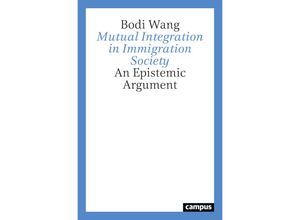The public culture of the receiving society and the dominant understanding of belonging and
political membership can influence the social participation of immigrants as much as
immigration law. However current discussions of integration focus primarily on the
distribution of rights and neglect the role of tacit knowledge. Through a systematical and
philosophical analysis of identity's role in policy-making governance and social practice
Bodi Wang shows how a one-sided understanding of integration resembles »assimilation« and why
integration should be expected from locals as well. Weaving together extensive findings in
sociology history critical race theory and Chinese philosophy with ethics and migration
studies this book provides a compelling argument for adopting the concept of »mutual
integration« to overcome injustice and to enhance social solidarity.



